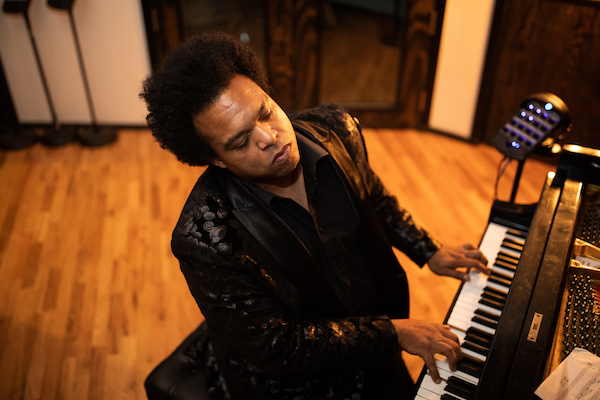Dec 9, 2025 12:28 PM
In Memoriam: Gordon Goodwin, 1954–2025
Gordon Goodwin, an award-winning saxophonist, pianist, bandleader, composer and arranger, died Dec. 8 in Los Angeles.…

Pianist ELEW and guitarist Kurt Rosenwinkel worked together on the solo piano album Cubism.
(Photo: Anna Yatskevich)In 2005, Eric Lewis dropped off the straightahead jazz scene to reinvent himself. Adopting the moniker ELEW and eschewing a piano bench for the more athletic approach of standing in front of his instrument, he began setting tunes by rock acts like Linkin Park and Coldplay within his abundant jazz and classical vocabularies.
He dubbed his music “rockjazz” and first documented the concept on 2010’s ELEW Rockjazz Vol. 1, which included instrumental covers of The Rolling Stones’ “Paint It Black” and Nirvana’s “Smells Like Teen Spirit.”
On Cubism, a daring solo piano album released on guitarist Kurt Rosenwinkel’s Heartcore Records, ELEW interprets the label head’s music with rather startling results.
“Kurt certainly knows his way around the keyboard, and his father played piano,” ELEW said about the guitarist, who also produced Cubism. “When we were in the studio, he was telling me how his father would take some sort of an idea and just go off in all these different types of directions with it. And Kurt would encourage me to do that, too, on some of his pieces.”
A great example is ELEW’s radical reimagining of “Synthetics,” a burner that originally appeared on Rosenwinkel’s 2000 The Enemies Of Energy. Taking the piece at a slow crawl, the pianist investigates the harmonic fabric of the chops-busting head while exploring the odd intervals and dissonant lines of the piece.
“Playing through the melody for the first time just took me back to my early 20s when I was researching Glenn Gould and came across his recording of Paul Hindemith’s ‘Prelude And Fugue in C,’” he explained. “So, I used that Hindemith-driven concept as the basis of my technical approach to it and my improvisation as well.”
While the pianist tackles Rosenwinkel’s technically demanding “Cubism”—a tune he introduced on saxophonist Mark Turner’s 1995 Yam Yam—he also extrapolates freely on that heady number in a piece dubbed “Cubist Cubism.”
“I wanted to try a bitonal concept by merging Kurt’s tune with this device that I created to train my left hand, which consists of playing three different parts of time simultaneously,” he explained. “‘Cubism’ already has all different scales and chords piled upon one another, à la ‘Giant Steps’ times two. The idea of playing on top of that with the device in my left hand became an exciting challenge. And it was just so compelling that we decided to make two separate tracks of it.”
ELEW turns the bouncy waltz-time “Zhivago” into a mercurial conversation between left and right hands that has him emulating an offbeat rhythmic device that Art Tatum employed on his recording of “Get Happy.” ELEW added that his approach here also was profoundly influenced by Keith Jarrett’s “In Front” and “Starbright” from the 1972 album Facing You.
On “Use Of Light,” he employs unconventional dampening techniques for percussive effect. “On the first take, I used my left hand as a palm mute on the strings, while my right hand would be playing bass notes and melody,” he explained. “On the next take, Kurt came into the live room and put both of his hands on the strings, so we had three hands inside the piano. Eventually, we grabbed this huge Star Wars coffee table book from the waiting room, stuck it inside the piano along with some blankets and some weights that we found in the studio, to completely mute the bottom end of the piano.”
“The whole process was pretty wonderful,” ELEW said of his close collaboration with Rosenwinkel. “On each tune, Kurt and I would just sculpt different things and try things out. There’s all these riches and possibilities in his writing. It’s almost like opening a Pandora’s Box of uncorked music, and out comes something very different from what you might expect.” DB

Goodwin was one of the most acclaimed, successful and influential jazz musicians of his generation.
Dec 9, 2025 12:28 PM
Gordon Goodwin, an award-winning saxophonist, pianist, bandleader, composer and arranger, died Dec. 8 in Los Angeles.…

Belá Fleck during an interview with Fredrika Whitfield on CNN.
Jan 13, 2026 2:09 PM
The fallout from the renaming of the John F. Kennedy Center for the Performing Arts to include President Donald…

The success of Oregon’s first album, 1971’s Music Of Another Present Era, allowed Towner to establish a solo career.
Jan 19, 2026 5:02 PM
Ralph Towner, a guitarist and composer who blended multiple genres, including jazz — and throughout them all remained…

Peplowski first came to prominence in legacy swing bands, including the final iteration of the Benny Goodman Orchestra, before beginning a solo career in the late 1980s.
Feb 3, 2026 12:10 AM
Ken Peplowski, a clarinetist and tenor saxophonist who straddled the worlds of traditional and modern jazz, died Feb. 2…

Rico’s Anti-Microbial Instrument Swab
Jan 19, 2026 2:48 PM
With this year’s NAMM Show right around the corner, we can look forward to plenty of new and innovative instruments…